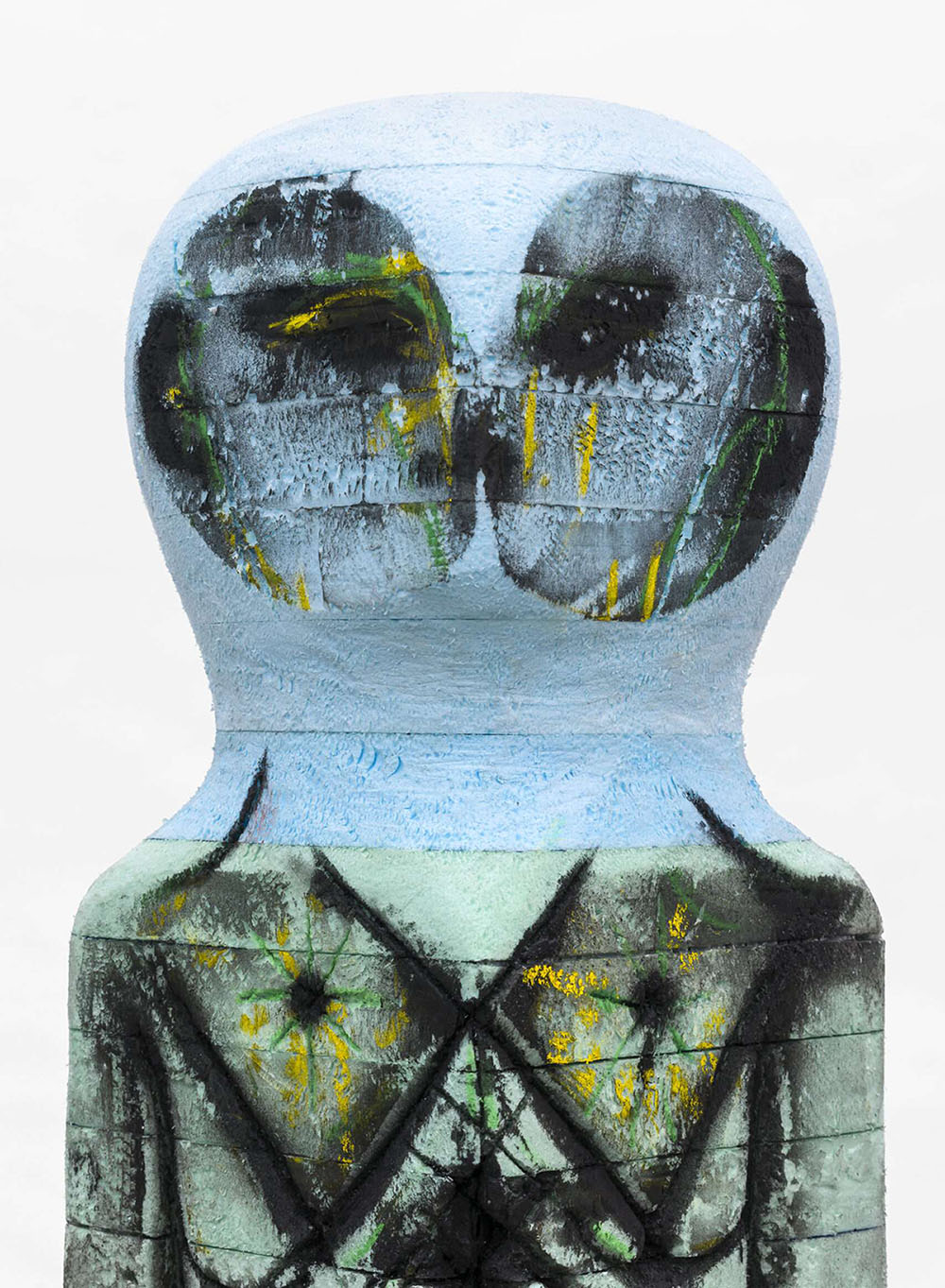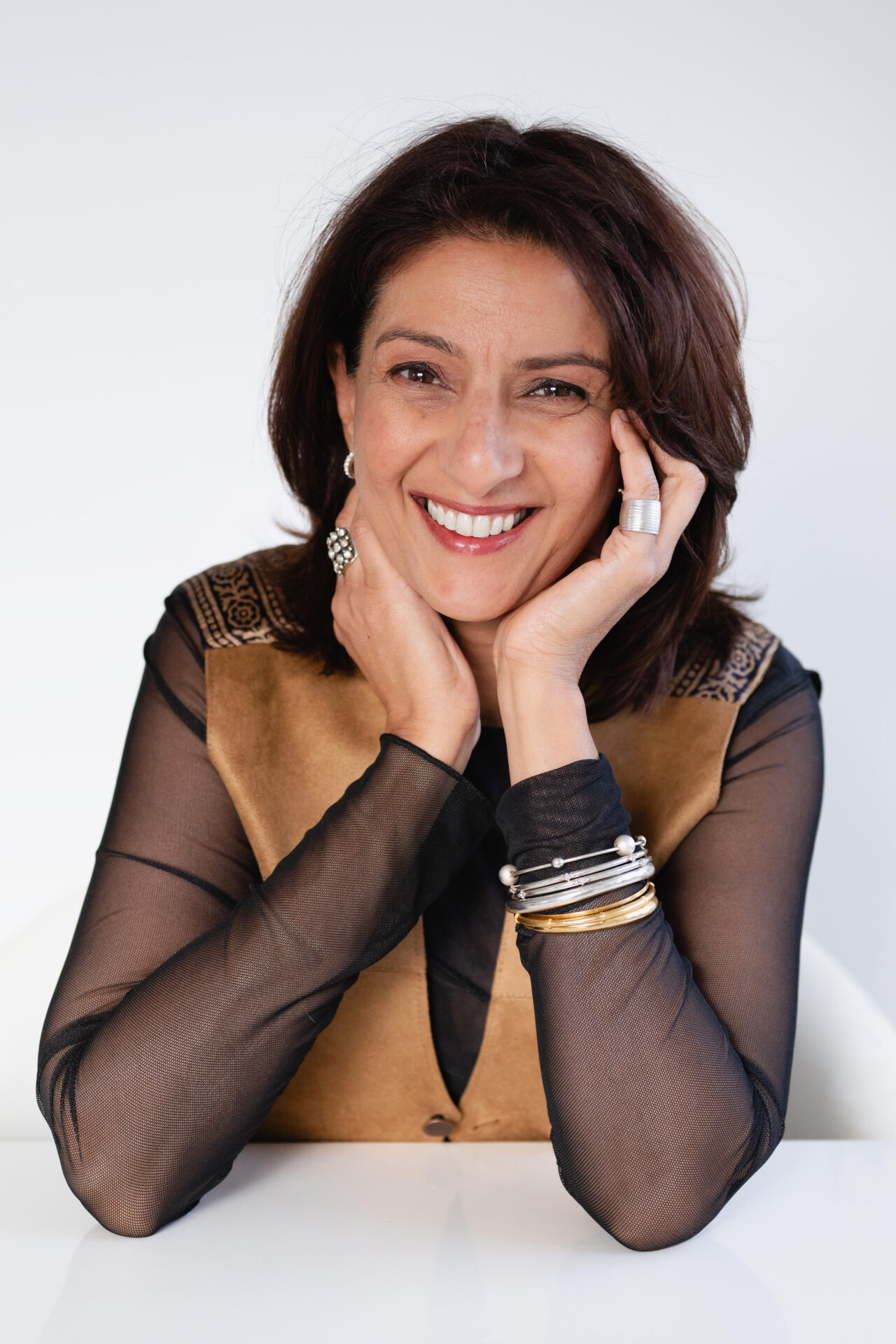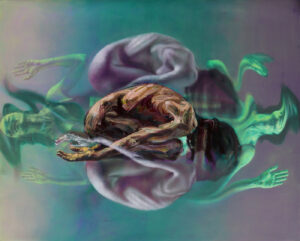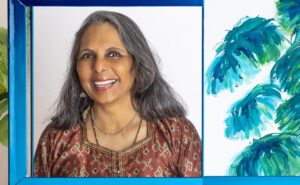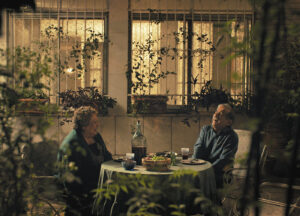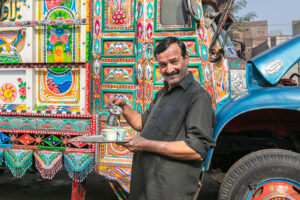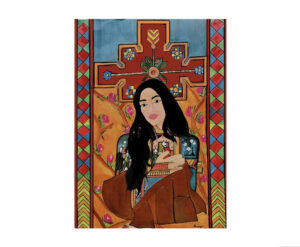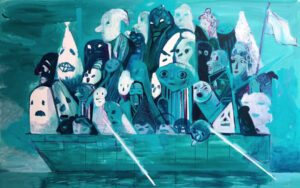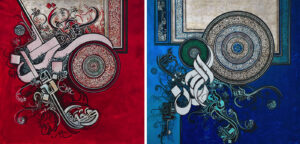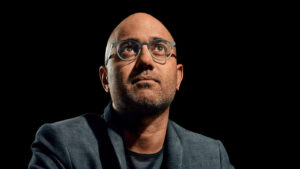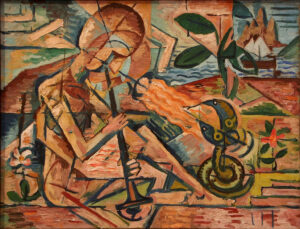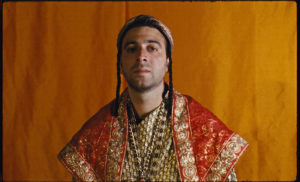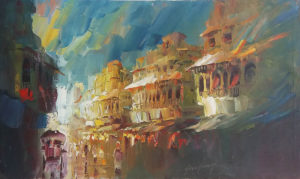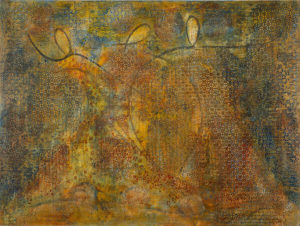When Mehreen and Asma compare notes, they realize they are still not unfettered lovers.
Mehreen stretched her arms above her head and yawned. Their eyes met for a moment, then Asma looked away. Their relationship was at a stage where they knew what each other was thinking just from their expressions. The sun was already slipping away without having had its chance to shine because of the smog. Some days were like that. Never succumb, Asma said to herself. Never, not to the noise, or this business of life. Better the silence of sorrow. She had had a craving for karak chai, so they’d come to Lahore Chai Masters, a dilapidated kiosk in one of the gullies off Walton Road. Further down the alley, a group of men were seated in a circle on the ground playing rummy. This is what you did on a lazy Sunday afternoon.
A waiter with a pink showering cap on his head placed two cups of tea on the wooden stool. He covered them with saucers to stop the tea from cooling and keep away the flies. They were his only customers.
“What a time of day it is,” Asma said, “as though our whole lives were compressed into this hour.”
Mehreen gave her a sharp look.
“Doesn’t it?” Asma said.
A crow rocked on the dead wires above them and cawed, Mehreen did not reply but kept her gazed fixed on her. Asma lifted the saucer and picked up her cup. Of course Mehreen had heard her, but why didn’t she respond? What was she thinking? It was moments like these when Asma needed reassurance, and Mehreen wasn’t forthcoming, that Asma felt she’d never been understood. No, she must not think that. She took a sip of tea. The waiter was still standing there, leaning against the door with his arms folded, looking across at the card players. It was hard to tell whether he was eavesdropping.
“Your skin’s looking tired and patchy,” Mehreen said. “Around here and here.” She pointed to her own face under the eyelids.
Asma made a gesture with her hands, she would not let Mehreen make her feel small. “And you need to learn some manners,” she said. She looked over Mehreen’s shoulder towards Walton Road where the traffic had come to a standstill. The pedestrians who had been moving in hurried lines like ants along the pavements outside the shops had come to a standstill and gathered in a crowd in the middle of Walton Road.
“What’s happened?” Asma said to the waiter.
“I’ll go and check.” He walked down the gulley and returned in a few minutes. “The usual; a motor bike and car collision.”
“That’s life, isn’t it?” Asma said. “You keep going until you crash. You pick yourself up and try again. Then you meet another obstacle, you fall off…”
“And what if you can’t get up?” Mehreen said.
“You…” She was interrupted by shouting from the road, where opposition demonstrators were chanting slogans and waving billboards. Earlier that week the ex-prime minister had been shot in the leg and now his supporters were protesting. Men shouting for democracy, for their rights to be heard, for justice, while in a balcony overlooking the street, as if none of it mattered at all, a woman, probably exhausted to the bone, took down the washing from a line and went back inside to feed her baby and prepare supper. The noise faded; the demonstrators had joined the spectators at the accident scene.
“Why don’t people just obey the law?” the waiter said, loudly. “They like to cause problems for nothing.”
Asma wasn’t sure if he expected a reply. He adjusted his shower cap and returned to lounging by the door, standing over them like a sentry.
“I always think of that day,” Mehreen said, quietly. “I haven’t forgotten it, you know.”
“Which one?” Asma said.
A man with a basket of flutes on his back stopped in front of their bench. He placed his basket on the ground, took a flute from his pocket and began playing an old, familiar tune which took Asma back to another time, in another city.
She was standing in a hotel car park, surrounded by empty cars, and tall, buildings with lights on in every office and no one inside. The moon was pale, the night was dark, and she was completely alone. Her arms were wrapped around herself, offering her nothing, except a sense of her own presence. From the street beyond the hum of traffic, the beat of drums, live music from a rooftop bar with flashing neon lights. And then she was running barefoot, down the narrow path on the rough stones even though they cut the soles of her feet to the beach, until she reached the soft, pale, sand and collapsed at the foot of the ocean. The black, oily waves rolled back and forth over her knees, and she was soaked up to her waist. Ten years had passed since that terrible night in Dubai.
The flutist finished his song and stood there with an expectant look. Mehreen gave him five hundred rupees and he thanked her. She beckoned to the waiter, “My chai’s gone cold. Could you please bring me a fresh one?”
“Are you really planning on drinking it?” Asma said.
“Why not? It’s why we came here, isn’t it?” Mehreen gave her a teasing look and Asma was reminded why she loved her. The waiter took away the old cups and put two fresh steaming ones in front of them. Mehreen stirred ground jaggery in her tea.
Everything Asma had felt that night, what she had wanted, imagined, and desired, all of it were clear to her as if it had been yesterday. That night, in that city with more buildings than trees, more cars than birds. That night, in that city made by people with temporary lives and broken dreams.
“Where are you lost?” Mehreen said.
Asma made an impatient gesture. “I’m here, right here, in front of you. Where else could I be?”
“Lost, always, that’s how you always are. Lost, far away in your thoughts.” Mehreen lifted her cup and put it down without taking a sip. “What’s the matter, love? Aren’t you enjoying the tea today?”
“I am, of course, I am,” she said. She knew she sounded defensive but did not care and made no effort to pick up the cup.
Mehreen took a vape from her handbag and put it between her lips. She seemed to be in a state of restful thinking. She was continually plotting, planning her next creation, designing her next grand, artistic idea. That’s why she had an aura of self-confidence and achievement about her; she always accomplished her goals. That’s how it was. Some made it, while others were barely survived.
An elderly, overweight woman in a faded yellow salwar khameez limped towards them, her swollen feet squashed into slippers too small for her. “I’m going to the market,” she said to the waiter. “But I’ll be back later for my tea. Don’t add too much sugar, unless you want me to die. The doctor’s warned me about diabetes.” She broke out into a rasping cough.
The waiter replied he’d keep it ready.
Ordinary days of our ordinary lives. Some struggling to find meaning, others just accepting things as they were.
“I often think about it,” Mehreen said. She drained her cup and asked the waiter for another tea. He stayed idling by the door, so Mehreen repeated her request.
“I heard you the first time. What’s the hurry?” he said irritated and moved inside the kiosk.
Mehreen lowered her voice. “Do you know my love, you’re the only woman I’ve ever loved.” She frowned, the lines on her brow deepened, her eyes deep and serious, and then her face relaxed into a teasing expression which she knew would make Asma laugh. For a moment, it lifted the tension between them.
“Am I?” Asma said.
“It happened in that desert city,” Mehreen said, “with hundreds of skyscrapers, where everything is efficient, clean and organized.”
“Yes.” Asma leaned forward.
“I was there for my first solo exhibition. Everyone was excited about my work, talking about my style, my technique…” she drifted off. “They said my work showed the same defiance as Paula Rego. There were people from all over the world at the gallery, from Venice, London, Berlin, important artists…Dubai felt like it was the only place to be.” Mehreen had a slight smile, the memory of something that had brought her satisfaction. “Since then, I’ve been back to Dubai several times, but it’s changed. It’s built up and congested. It takes hours to get from one place to another. Everywhere you look, nothing but concrete and glass. Everything is automated. The gallery where I had my exhibition had shut down and even that rooftop bar where we went that evening has disappeared without a trace.” Her voice became calmer. “I haven’t thought about the evening in years, but then today I remembered her when we were walking here when we walked past the travel agent with the advert in his window for a holiday in Dubai…
She was much younger than me, about ten years, and in her late twenties, very pretty and doing her PhD. She was working at the gallery as an intern and helping with the catalogue. At the time I was with someone else, a man, more my age. I’d been with him for a few years…” She paused, her face had a softness, a look of nostalgia.
Asma looked in the distance towards Walton Road. The crowd had dispersed. The traffic had returned to a steady hum. The rhythm of the sprawling ancient city had already absorbed the fall and adjusted to the recovery.
“I remember that afternoon when I was getting the paintings hanged in the gallery…,” Mehreen said, … “my partner was talking to someone else, and I beckoned to him to join me. But she caught that intimate look and thinking it was for her, came and stood next to me. Our shoulders brushed, and I pretended that it had been her that I’d been calling, but seconds later when my partner joined us, she realized she’d made a mistake. Embarrassed, she moved away. I can’t forget…”
“What?” Asma felt her anger rising.
“One night we were in the gallery working. Even now I can recall…”
“Yes?”
“…that moment when she came and stood in front of me, and then, and then, without warning she took all her clothes off. I hadn’t noticed her enter the studio, because I’d been focused on putting the final touches to a portrait.” Her voice became softer. “‘Paint me,’” she said to me. ‘I want you to paint me.’ I remember how she said it. She was so shy, so lovely, standing in front of my easel, completely naked. I had a brush in my hands. I remember it clearly even now, how the lamp from my desk cast a glow on her smooth, brown skin, and we could hear the strains of music coming through the open window from the bar …” She took Asma’s hand and folded it in hers.
“Please stop…” Asma said, with a small cry.
“It was just her and me in the studio. What could I do?” Mehreen said. “I went over and kissed her. I couldn’t stop myself from stroking her back, her shoulders. I knew it was wrong, I was with somebody else. …”
“Oh.”
“We never made love, if that’s what you’re wondering. We only kissed, that’s all.”
“But she asked if she could be your model, not for you to …”
“Naïve, she didn’t know what she wanted. I picked up her shirt and draped it around her. I told her she was too young. I don’t know why I said no, my other models were about her age…”
“You shouldn’t have kissed her. You shouldn’t have, you were with someone else…” Asma tried to pull away her hand, but Mehreen wouldn’t let her.
“She knew I was.”
“You kissed her,” Asma said, angrily.
“Yes, my love, I kissed her. I knew she wanted me too.” Mehreen smiled, let go of Asma’s hand, as the waiter appeared. He gave them a strange look.
“Another five minutes,” he said. “The tea is still cooking.” He took his mobile phone from his pocket and began typing.
Asma picked up her cup and cradled it, trying to control her emotions. “She came to you because…and you know very well what you did was…”
“Was what?” Mehreen said.
“Cruel. She’d been with you in the gallery for a month. You and her…” She tried to hold back the tears. “How could you have been so mean?”
“She was so young, so lovely, and she had no idea what she wanted. We were together, all of us at the gallery, pulling all-nighters, working around the clock. But when the exhibition was over, she suddenly disappeared. She went on to finish her PhD in Mughal miniatures, but …” Mehreen’s voiced drifted off.
Asma put down her cup. “That night, that night when you kissed her,” she said, “imagine how it must have been for her. How she must have been planning it for days. How she must’ve sat thinking about you, for hours on end, assessing the risk, not just to her, but also to you. It was a forbidden love. You and her — she knew it could be disastrous…you could end up in jail. But did you give a thought to that? How she must’ve been waiting for a chance when everyone, including your lover, especially, was not in the studio? How she must have thought about what to wear, and, and, how she would ask if she could model for you. Imagine how she must’ve been watching, waiting for the perfect moment when you were alone in your office, when she could have her chance…”
“I couldn’t focus that evening,” Mehreen said. “Of course, I was conscious that it was only her and me in the studio. I remember how she stood there, and unbuttoned her shirt. How she’d been so charming, so hesitant. The moment is clear in my mind, as if it happened yesterday. It was almost midnight. The gallery was on the thirty sixth floor. Around us buildings with lights on. She was so beautiful.” She took Asma’s hand in hers, and caressed the inside of her wrist, just near her pulse. Her fingers were warm. “I don’t know why I’ve been thinking about that night so much these past few days.”
“But that night, that night, you, you sent her away. You rejected her.”
Mehreen gave a small, low laugh. “And because of that she stopped speaking to me. A few months later I heard through the grapevine she was with someone else, a female artist, who’d come into the studio, and I’d introduced her to. She made sure I knew about it. I knew she couldn’t stand me because I’d hurt her.”
“Imagine how she must’ve felt. How it must’ve been for her that night. How she collected her clothes from the floor, and left your room naked, almost crying…”
“She was shouting, calling me names, swearing. I tried to calm her down, and tell her I hadn’t meant to hurt her, but she wouldn’t listen.” Mehreen’s fingers stopped stroking.
“She put on her clothes,” Asma said, “and took the elevator to the ground floor. She left the building, shivering. She ran, without her shoes on, without thinking, to the beach. It was completely deserted. She was completely alone. There was not a soul in sight. She was shaking like a leaf. She went and sat under the palm tree where you’d kissed her that same morning. She thinks of that morning and that night, every day, every, single day.”
Mehreen shook her head. “It wasn’t my fault.”
“It was awful,” Asma said, tears rolling down her face. “Awful. She’ll never forget it, never. And nothing will ever make up for it. That night haunts her. Especially when everything seems perfect, she suddenly remembers that night, and how alone she’d felt and how she’d run, crying to the beach. She’d been ready to risk everything. Everything. For what? For Love…” She was sobbing. “For Love.”
“Please, my love, don’t say that. It wasn’t my fault. How could it be?” Mehreen lifted Asma’s hand and kissed it, her eyes searched her face. “Please don’t cry.”
She caressed Asma’s wrist, saying soothing words.
Asma pulled away as the waiter returned. He placed two cups carelessly on the stool, spilling tea everywhere. “Lahore Chai Masters is for decent people,” he said, in an insolent tone. “We don’t allow troublemakers in here.” He did not bother to wipe the mess with the tea towel hanging over his shoulder. “Besharami.”
“Bring us the bill,” Mehreen said, her voice low with anger.
Asma reached for her cup. A thin film had formed on the surface of the cold tea. Even now they had to be careful. People were always looking.
Theirs was still a forbidden love.



